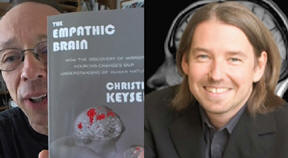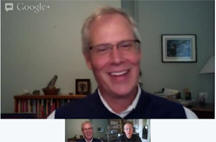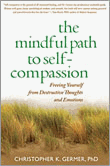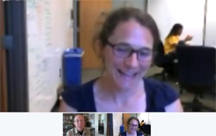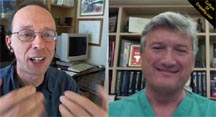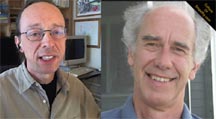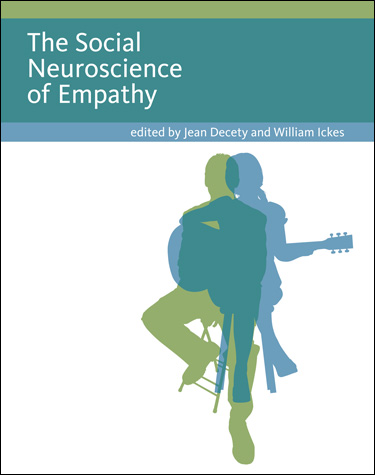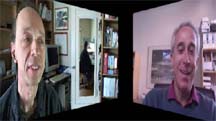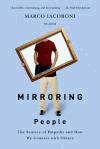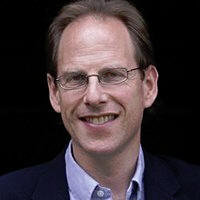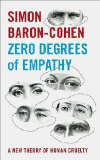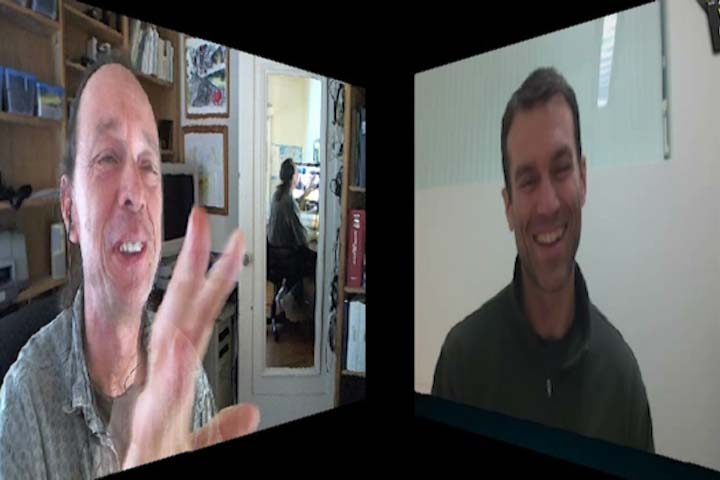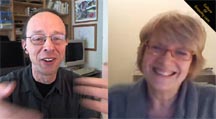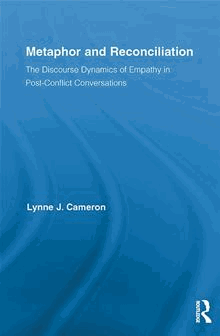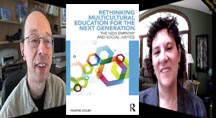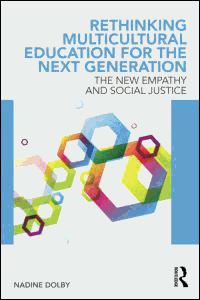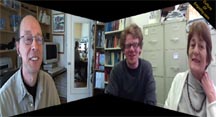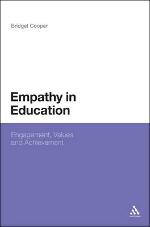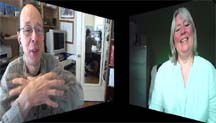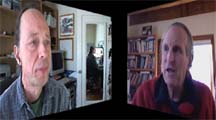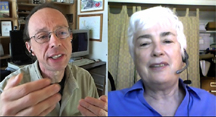|
|
Conference
- Panels
-
Possible Panels
- Facebook
Event -
Education -
Volunteer - [Planning]
International Online Conference on:
How Might We Build a
Culture of Empathy?
Permanently Ongoing
Sub Conference: How to Build
a Culture of Empathy with Science and Academics
http://j.mp/L0QNlt
|
|
|
|
|
|
|
Understanding Empathy and
Compassion
Tania Singer |
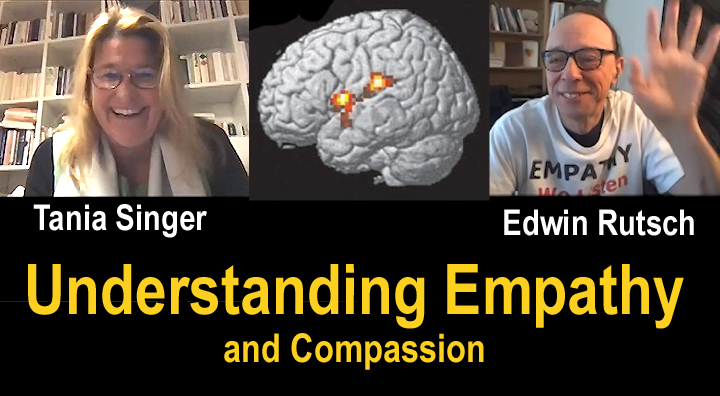 |
|
Tania Singer is a social neuroscientist and psychologist at the Max Planck
Institute in Berlin, Germany. Her research aims to increase our
understanding of the foundations of human social behavior. Adopting an
interdisciplinary approach, she and her team investigate the neuronal,
hormonal, and developmental foundations of human social cognition, social
and moral emotions such as empathy and compassion. In this dialogue we
discussed the nature of empathy and her studies on different empathy
and compassion training types and their benefits.
Study Conclusion:
"Contemplative dyads elicited engagement similar to classical contemplative
practices and increased perceived social connectedness. Contemplative dyads
represent a new type of intervention targeting social connectedness and
intersubjective capacities deficient in participants who experience
loneliness and in many psychopathologies."
In other words, there are a lot of benefits in
people empathically listening to each other. One of the benefits is
that it reduces social anxiety about being judged and they feel more
connected. This feeling of lower stress and greater connection lasts over
time as well.
Sub Conferences:
Science |
|
|
|
|
|
|
|
Different
Faces of Empathy:
feelings of similarity disrupt recognition
Jacob Israelashvili |
|
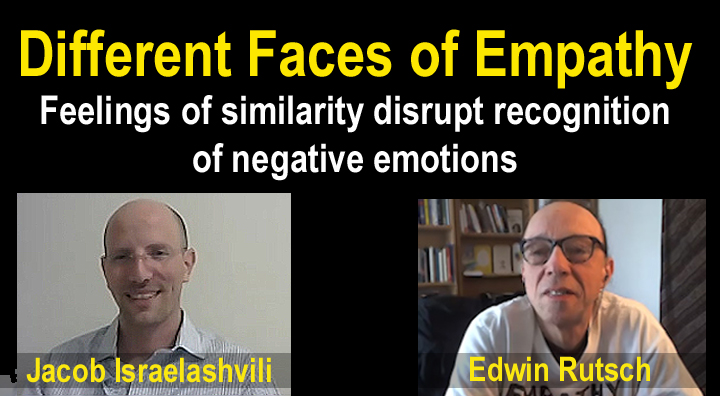
|
|
Jacob Israelashvili
did his PhD in Social Psychology at Tel Aviv University. His
research examines the empathic processes that
antecedent understanding and caring for others. Jacob recently
coauthored a study and paper entitled:
Different faces of empathy: Feelings of similarity disrupt recognition of
negative emotions.
In
this interview we talk about that study.
Some Highlights of the Study.
-
Recognition of emotions becomes less accurate when having
had similar negative experiences.
-
Personal distress evoked by a negative story inhibits
recognition of the storyteller's emotions.
-
Being instructed to take another's perspective does not
help to recognize emotions better.
Sub Conferences:
Science |
|
|
|
|
Does Empathy have Dark
Sides or is it all Light?
Fritz Breithaupt |
|
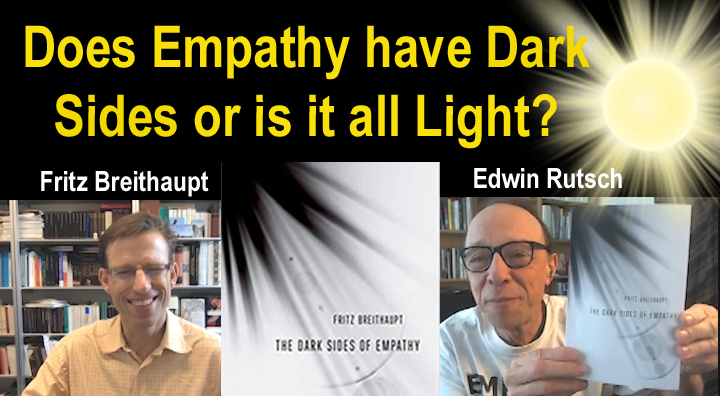
|
|
Fritz Breithaupt is
Provost Professor at Indiana University Bloomington. He founded
and directs the Experimental Humanities Laboratory at IU. He
is author of the book,
The Dark Sides of Empathy.
Fritz argues that some of the dark sides of empathy include;
self-loss, side taking, identifying with the helper, sadistic
empathy and vampiristic empathy. Edwin argues that empathy is
light and the so-called dark sides are not empathy, but blocks to
empathy.
Fritz says (and Edwin agrees)
that a benefit of empathy is;
"Empathy
intensifies our experiences and widens the scope of our perceptions. We
feel more than we could with-out it, and it enables us to participate more
fully in the lives of others, even fictional characters."
and
"Empathy
is, of course, a critical factor in healthy long-term relationships, too,
making it easier for us to understand our family members or romantic
partners and anticipate their emotional needs and reactions. Love without
empathy would be a sad thing for most people."
Sub Conferences:
Science |
|
|
|
|
|
|
|
Building Social and Cultural Empathy
Elizabeth Segal
|
|
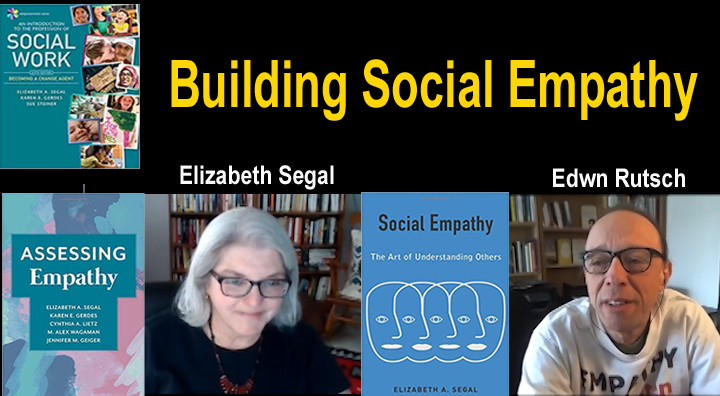
|
|
Elizabeth A. Segal is a social
policy analyst with a background in professional social work. She
currently holds the position of Professor in the School of Social Work
at Arizona State University. Dr. Segal's current research is on social
empathy, the application of empathic insights into creating better
social welfare policies and programs. She has begun work on creating a
compendium of methods to teach social empathy and an instrument to
measure people's inclination towards social empathy.
Elizabeth is author of many books, including;
*
Social Empathy:
The Art of Understanding Others
*
Assessing Empathy.
*
An Introduction to the Profession of Social Work.
Our ability to understand others and help others
understand us is essential to our individual and collective well-being.
Yet there are many barriers that keep us from walking in the shoes of
others: fear, skepticism, and power structures that separate us from
those outside our narrow groups.
To progress in a multicultural world and
ensure our common good, we need to overcome these obstacles. Our best
hope can be found
in the skill of empathy.
Sub Conferences:
Science |
|
|
|
|
|
|
|
Contemporary Perspectives on
Empathy,
Compassion and Self-Compassion
Chad Woodruff |
|
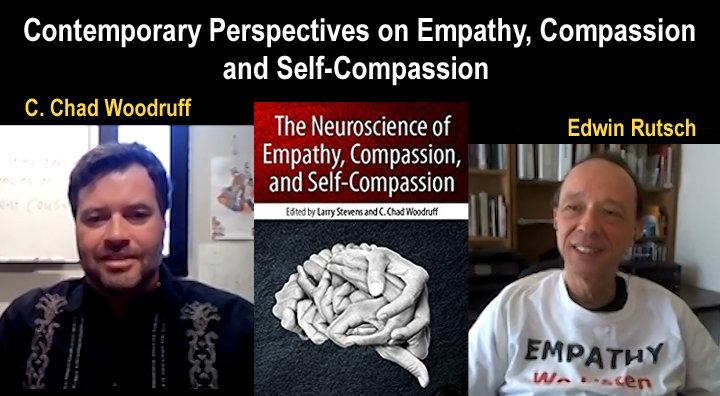
|
|
Chad Woodruff is a Cognitive Neuroscientist who uses neuroimaging
techniques to investigate social and cognitive processes. Chad has
had extensive experience as a graduate student, post-doctoral fellow, and
an assistant professor with neuroimaging and has mentored undergraduate
students in the use of these techniques for 10 years.
He is co-editor of,
The Neuroscience of Empathy, Compassion, and Self-Compassion. The
book provides contemporary perspectives on the three related domains of
empathy, compassion and self-compassion.
It informs current research, stimulates further research
endeavors, and encourages continued and creative philosophical and
scientific inquiry into the critical societal constructs of empathy and
compassion.
Sub Conferences: Science |
|
|
|
|
|
|
|
Developing an
Empathic Way of Being
with
Emotion-Focused Therapy
Robert
Elliott |
|
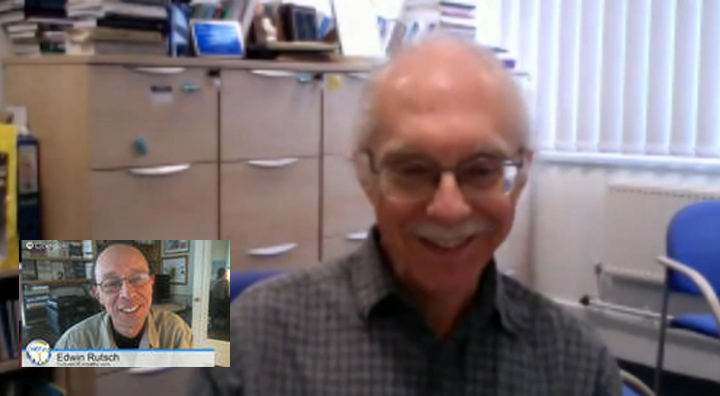
|
|
Robert Elliott is Professor of Counselling in the Counselling Unit at the University of Strathclyde,
where he directs its research clinic and teaches counselling research and
emotion-focused therapy. A professor Emeritus of Psychology at the University of Toledo
(Ohio), he is co-author of several books.
He previously
co-edited Psychotherapy Research, and Person-Centered Counseling and
Psychotherapies, and is a Fellow in the Divisions of Humanistic
Psychology, Psychotherapy, and Clinical Psychology of the American
Psychological Association. He also teaches workshops about empathy around
the world.
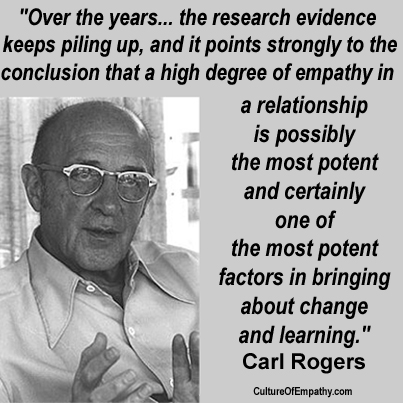
"Psychotherapist empathy has had a long and sometimes
stormy history in psychotherapy. Proposed and codified by Rogers and his
followers in the 1940's and 1950's, it was put forward as the foundation
of helping skills training popularized in the 1960's and early 1970's."
Sub Conferences:
Science
|
|
|
|
|
|
Entangled
Empathy: From an Ethics of Justice to an Ethics of Empathy
Lori Gruen |
|
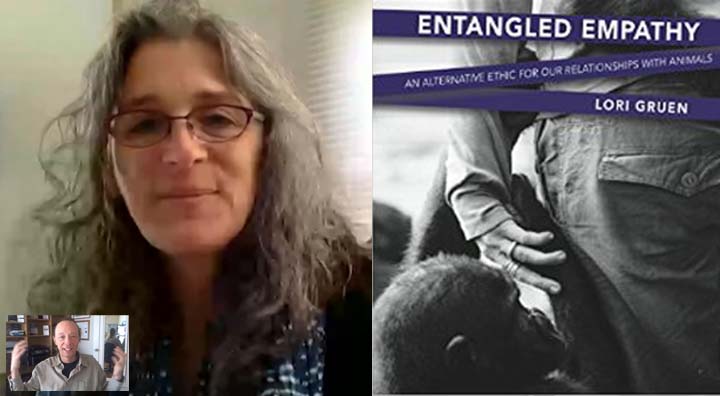
|
|
Lori Gruen is Professor of Philosophy, Feminist,
Gender, and Sexuality Studies, and Environmental Studies at Wesleyan
University where she also coordinates Wesleyan Animal Studies. Her work
lies at the intersection of ethical theory and practice, with a particular
focus on issues that impact those often overlooked in traditional ethical
investigations, e.g. women, people of color, non-human animals. She has
published extensively on topics in animal ethics, ecofeminism, and
practical ethics more broadly. Lori is author of,
Entangled Empathy,
An Alternative Ethic for Our Relationships with Animals.
"Empathy is also something we are taught to "get over"
or grow
out of. We learn to quash our caring reactions for
others, and
our busy lives and immediate preoccupations provide
excuses for not developing empathy."
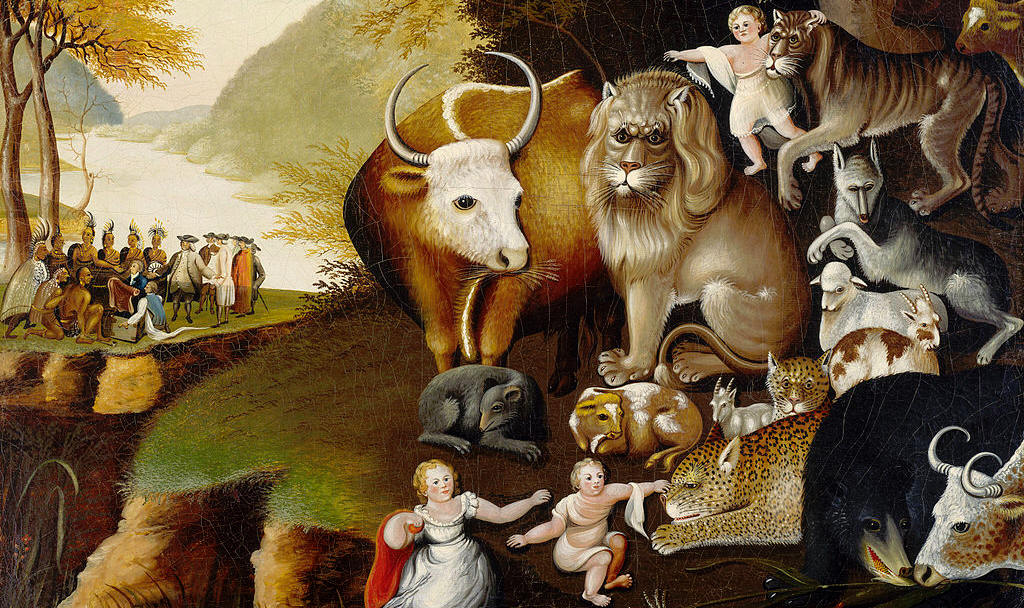
Edward Hicks -
The Peaceable Kingdom
(Wikipedia)
From the book
description, "In Entangled Empathy, scholar and activist Lori Gruen argues
that rather than focusing on animal "rights," we ought to work to make our
relationships with animals right by empathetically responding to their
needs, interests, desires, vulnerabilities, hopes, and unique
perspectives. Pointing out that we are already entangled in complex and
life-altering relationships with other animals, Gruen guides readers
through a new way of thinking about - and practicing - animal ethics."
Sub Conferences: Science
|
|
|
|
|
|
Empathy and
Morality: Heidi Maibom and Edwin Rutsch
|
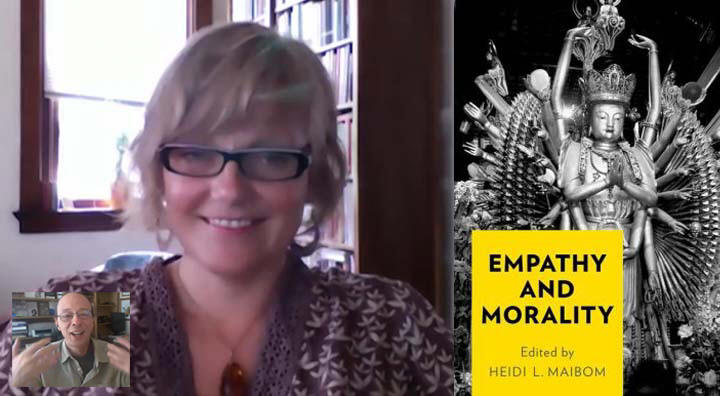 |
|
Heidi L. Maibom is professor of philosophy at University of
Cincinnati. She studied at University of Copenhagen, University of
Bologna, and University College London, and has held fellowships at
Cambridge and Princeton Universities. She works on folk psychology,
empathy, responsibility, and psychopathy. Heidi is the editor and
contributor to the book, Empathy and Morality. She wrote the first chapter
titled, Introduction: Everything you ever wanted to know about empathy.
Empathy
and Morality, the book publisher's description: "This collection is
dedicated to the question of the importance of these capacities to
morality. It brings together twelve original papers in philosophy,
psychology, psychiatry, anthropology, and neuroscience to give a
comprehensive overview of the issue and includes an extensive survey of
empathy and empathy-related emotions.
Some contributors argue that empathy is essential to core
cases of moral judgments, others that empathic concern and moral
considerations give rise to wholly distinct motives. Contributors look at
such issues as the absence of empathy in psychopaths, the use of empathy
training for rehabilitating violent offenders, and the presence of empathy
in other primates. The volume is distinctive in focusing on the moral
import of empathy and sympathy."
Sub Conferences:
Science |
|
|
|
For & Against Empathy: Is
Empathy Necessary for Morality? Jesse Prinz & Edwin Rutsch
|
|
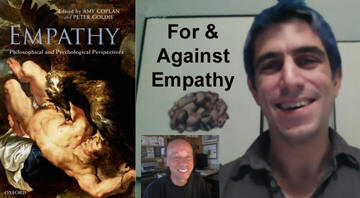 |
|
Jesse Prinz is Distinguished Professor at City University of
New York, Graduate Center. He says "I work primarily in the philosophy of
psychology, broadly construed. I am interested in how the mind works. I
think philosophical accounts of the mental can be fruitfully informed by
findings from psychology, the neurosciences, anthropology, and related
fields. My theoretical convictions are unabashedly empiricist. I hope to
resuscitate core claims of British Empiricism against the backdrop of
contemporary philosophy of mind and cognitive science."
Jesse wrote a couple of papers critical of empathy titled, 'Against Empathy'
and 'Is
Empathy
Necessary for Morality?' His work
has been referenced by other articles critical of empathy like
'The Baby in the Well, The case against empathy'
by
Paul Bloom in The New Yorker
and 'The
Limits of Empathy'
by David Brooks in the New York Times.
In this engaging interview-dialog, Edwin Rutsch empathizes
with Jesse about the problems he sees with empathy and replies to some of
the criticisms. Jesses says, "empathy is prone to biases that render
it potentially harmful. Another construct—concern—fares somewhat better,
but it is also of limited use. I argue that, instead of empathy, moral
judgments involve emotions such as anger, disgust, guilt, and admiration.
These, not empathy, provide the sentimental foundation for morality."
Sub Conferences:
Science:
Philosophy |
|
|
|
Denise Cummins: What's Wrong With Empathy?
|
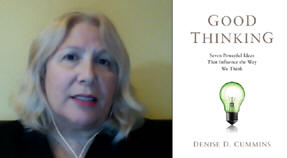 |
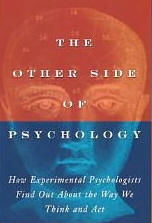 |
Denise Dellarosa Cummins is a retired Adjunct Professor of
Psychology and Philosophy, University of Illinois at Urbana-Champaign. Her
research interests include the evolution and development of higher
cognition in artificial and biological systems. Her experimental
investigations focus on Causal Cognition, Social Cognition, and Moral
Cognition. |
Denise is
an
author and contributor to several books including,
Good
Thinking
and
The Other Side of
Psychology.
She wrote an article
tiled
What's Wrong With Empathy,
as a
response to 'The
Case Against Empathy' by Paul Bloom in The New Yorker.
She writes, "To most of us, the idea that empathy is a good thing is a no
brainer. The more we empathize with the plight of others, the more ethical
and moral we behave towards them. Yet a number of psychologists and
philosophers reject this view....
Some experts
believe empathy leads to bad moral judgments and bad social policy... The
desire to censure empathy stems from the belief that empathy and other
emotions necessarily lead to anarchy and retributive justice, while reason
necessarily leads to order and good judgment. Yet sufficient evidence from
the annals of human history plainly shows that reason, untempered by
empathy, is just as likely to lead to tyranny and genocide as it is to
lead to good judgment. When compassion and reason are decoupled, judgment
is not improved. Instead, the door is opened to inhumane practices."
Sub Conferences:
Science |
|
|
|
Olga Klimecki & Edwin Rutsch: Dialogs on Building Empathy & Compassion
|
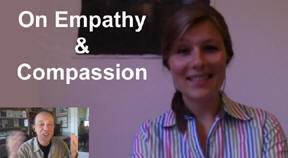 |
|
Olga Klimecki did her PhD with
Tania Singer at the University of Zurich, Switzerland, and at the
Max Planck Institute in Leipzig, Germany. She is interested in understanding the neural
mechanisms that shape our social emotions in adaptive ways. In several longitudinal studies,
she examined
how far training social emotions, like compassion and empathy, changes
affective experience, prosocial behaviour, and neural function (as measured
by fMRI). |
|
In January 2013, Olga started as a postdoctoral researcher
at the Swiss Center for Affective Sciences in Geneva, Switzerland. The goal
of the current project is to investigate the elicitation, expression and
regulation of anger.
In our dialog we discussed different definitions of empathy, sympathy,
compassion, personal distress, compassion fatigue and empathy fatigue.
People use these various terms differently and interchangeably. This
causes a great deal of confusion and misunderstanding. We also
explored dealing with personal distress
and how to develop personal resilience
by using mindfulness practices, empathic listening and empathy circles.
Sub Conferences:
Science |
|
|
|
Wynn Schwartz: Dialogs on How to Build a Culture of Empathy
|
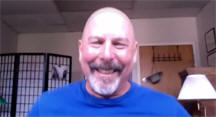 |
|
Wynn Schwartz a clinical psychologist and psychoanalyst
offering psychotherapy, consultation and supervision in Boston for more
than thirty years. He is professor on the core faculty of the Massachusetts
School of Professional Psychology and on the faculty of Harvard Medical
School. He supervises trainee psychotherapists at The Cambridge Hospital.
|
|
Wynn has written several articles about empathy. He says,
"Empathy involves the accurate communication of an appreciation of another
person's ongoing intentional actions in a fashion that the other person can
tolerate. This appreciation requires understanding the other person's view
of their world and of their place in it. Empathy is an ordinary feature of
life, a natural aspect of the unfolding improvisation of our linked
behaviors. We act together from our understanding of what the other is
trying to do."
Sub Conferences:
Science |
|
|
|
David Howe:
Empathy: What It Is and Why It Matters!
|
|
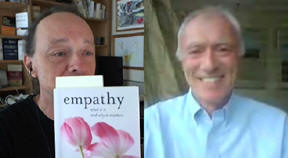 |
 |
David Howe is currently an Emeritus Professor in the School
of Social Work and Psychology at the University of East Anglia. After an early career as a child
care officer and social worker, in 1976 David Howe began his present
career as a university researcher and teacher. His research and writing interests
span social work theory, adoption, emotional intelligence, attachment
theory, and child abuse and neglect. |
|
To
date, David has written 17 books, many of them regarded as best-sellers.
He is author of Empathy: What it is and why it matters. "Empathy is key to good relationships. In its absence, behavior becomes
puzzling, even dangerous. David Howe's fascinating new book examines what
empathy is, why we have it and how it develops. He explores the important
part empathy plays in child development and therapeutic work as well as
its significance for how society organizes itself."
Sub Conference: Science
|
|
|
|
Abigail Marsh:
Psychopathy, Fear & How to Build a Culture of Empathy
|
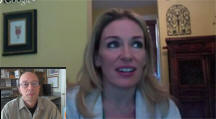 |
|
Abigail Marsh is a
professor at Georgetown University. Her area of
expertise includes social and affective neuroscience, particularly
understanding emotions such as empathy and how they relate to aggression,
altruism, violence and psychopathy. Her
research is aimed at understanding aspects of human social interactions,
emotional functioning, and empathy using cognitive neuroscience methods,
with a particular focus on emotion and nonverbal communication. |
|
Her research also includes studies with adolescents
and adults that incorporate neuroimaging, cognitive and behavioral testing, and
pharmacology techniques. Abigail also teaches a course titled "Empathy,
Altruism, & Aggression." The course addresses such
questions as; Are humans innately selfish or empathic? What do we mean
when we say empathy? Do selfish or empathic behaviors succeed best in the
long term? What is a psychopath? "
Sub Conference:
Science |
|
|
|
Marco Iacoboni and Edwin Rutsch: How to Build a Culture of Empathy
|
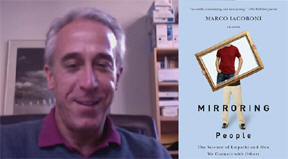 |
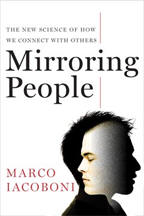 |
Marco Iacoboni is Professor of Psychiatry and Biobehavioral
Sciences and Director of the Marco Iacoboni Lab, UCLA Brain Mapping Center
at the University of California, Los Angeles.
He is author of,
Mirroring People: The New Science of
Empathy and How We Connect with Others. |
|
"Empathy plays a fundamental role in our social lives. It allows us to
share emotions, experiences, needs, and goals. Not surprisingly, there is
much empirical evidence suggesting a strong link between between mirror
neurons (or some general forms of neuronal mirroring) and empathy."
In this interview,
Marco Iacoboni challenges the traditional Western understanding of human
nature as selfish and struggling for surviving and suggests that
neurologically and evolutionally we are predispositioned to create
empathic connections. A culture of empathy can be increased by:
-
becoming aware about our biological capacity for empathy through mirror
neurons,
-
having intention to increase culture empathy,
-
creating more empathic living environment
-
decreasing the focus on differences and labeling
-
increasing the focus on us (similarities)
-
increasing empathic behavior of governments, leaders and media....
|
|
Empathy
Definitions, Measurements & Metrics: Marco Iacoboni, Lidewij Niezink,
Edwin Rutsch |
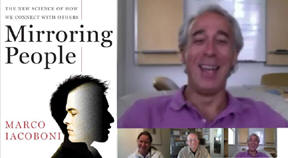 |
In this second interview, Marco Iacoboni, Lidewij Niezink
and Edwin Rutsch discuss
Definitions, Measurements & Metrics of Empathy. Marco says,
"I think what's interesting to me most is to define metrics of empathy.
How can I measure this thing? Why it matters? If we want to design
interventions to improve empathy we need to agree upon ways of quantifying
it. People do get bogged down in debates on definitions and don't even get
to the point of trying to discuss metrics of empathic behavior. This slows
down progress, I think"
Sub Conference:
Science |
|
|
|
Michael Slote: How to Build a Culture of Empathy
with an Ethics of Care
|
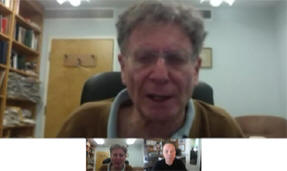 |
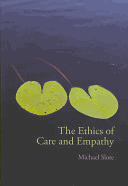 |
Michael Slote is Professor of Ethics. He has taught at Columbia
University, Trinity College, Dublin, and the University of Maryland, where
he was department chair for many years. He has written many articles in
philosophy of mind, ethics, and political philosophy.
|
|
He is also author of many books including:
The Ethics of Care and Empathy.
This book makes use of the
recent psychology literature on empathy to develop a version of care ethics
that applies to both personal and political morality.
In this dialog we went through Michael's book and discussed it
chapter by chapter. Michael says, "Care ethicists often
speak about empathy and its role in caring attitudes and relationships,
but they haven't stressed empathy to anything like the extent that I shall
be doing here. I shall, for example, be making use of the recent
literature of psychology to argue that empathy is the primary mechanism of
caring, benevolence, compassion, etc... I argue further, that caring
motivation is based in and sustained by our human capacity for empathy
with others."
Sub Conference:
Science |
|
|
|
Helen Weng: Dialogs on How to Build a Culture of Empathy
|
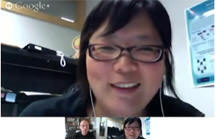 |
|
Helen Weng is currently a doctoral
student in clinical psychology studying the
Department of Psychology, Waisman Laboratory for Brain Imaging and
Behavior, and Center
for Investigating Healthy Minds at the University of Wisconsin - Madison.
Her long-term goals include studying how interventions that increase love
and compassion impact both psychological and physical health in patients,
and how training these qualities in health care providers can prevent
burnout and improve patient outcomes. |
|
Helen conducted a study titled,
Compassion
Training Alters Altruism and Neural Responses to Suffering.
"Compassion is a key
motivator of altruistic behavior, but little is known about individuals’
capacity to cultivate compassion through training. We examined whether
compassion may be systematically trained by testing whether (a) short-term
compassion training increases altruistic behavior and (b) individual
differences in altruism are associated with training-induced changes in
neural responses to suffering. "
Sub Conference:
Science |
|
|
|
Lou
Agosta: Dialogs on How to Build a
Culture of Empathy
|
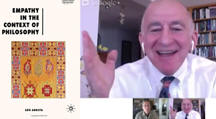 |
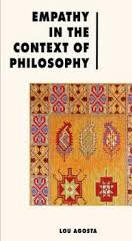 |
Lou Agosta is on the faculty of the Illinois School of Professional Psychology.
He practices psychotherapy in the Chicago. His area of concentration
includes the dynamic containing and transforming of domestic violence and
intimate partner abuse. |
|
Lou is author of
Empathy in the Context of Philosophy
which is an exploration of the deep structure of empathy as a fundamentally
human capability for creating possibilities of community and human
relations. He also writes extensively about the
nature of empathy on his website
ListeningWithEmpathy.com.
"The short definition of empathy is that it is the capacity to know what an
other individual is experiencing because (speaking in the first person for
emphasis) I experience it too, not as a merger but as a trace affect or
experience that samples the other’s experience. Thus, if one is overwhelmed
by the other’s trauma and re-traumatized, one is not using one’s empathy
properly. Simply stated, you are doing it wrong. "
Sub Conference:
Science
|
|
|
|
Vivian Bohl:
Dialogs on How to Build a Culture of Empathy
|
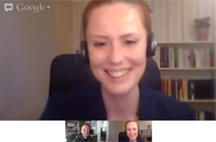 |
|
Vivian Bohl is
an
Estonian philosopher at Tartu University. She is a PhD student and her
doctoral work is in the field of social cognition. We talked about the
definitions of Empathy. She
says, "Defining
empathy has always been a tricky issue and up to now, the conceptual
issues surrounding 'empathy' are causing more and more confusion in
scientific and philosophical literature. It's about time someone did
something to solve these complex conceptual issues. I see that in your
project, you are also interested in compassion. This is a very important
empathy-related topic, in my opinion. |
|
For me, the best definition of compassion is a Buddhist
definition: it is the wish to alleviate the suffering of others and to
eliminate the causes for suffering. Since I'm quite happy with that
definition, we could discuss what this definition exactly means and also
talk about how to become a more compassionate person."
Sub Conference:
Science
|
|
|
|
Sylvia Morelli: How to Build a Culture of Empathy
|
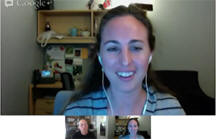 |
|
Sylvia Morelli is a Postdoctoral Fellow at
Stanford Social Neuroscience
Lab at Stanford University.
In her
current research, she examines the neural and behavioral basis of empathy
and perspective-taking, as well as the neural responses associated with
feeling understood by others.
We held a wide ranging
discussion about the nature of empathy, and her
work on researching it. In a recent study and paper,
Sylvia explored the neural and behavioral consequences of feeling
understood.
|
|
Sylvia says, when we are understood, or empathized with, the pleasure
centers of the brain light up. In other words, being empathized with feels
good.
"Behavioral research has demonstrated that feeling
understood by others enhances social closeness and intimacy, as well as
subjective well-being. In contrast, feeling misunderstood can be harmful
to social relationships, leading to loneliness and isolation.
However, it is still unclear why and how felt understanding exerts such a
powerful impact on both interpersonal and intrapersonal well-being"
Sub Conference:
Science:
Neuroscience
|
|
|
|
Maureen
O'Hara: How to Build a Culture of Empathy
|
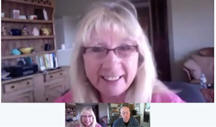 |
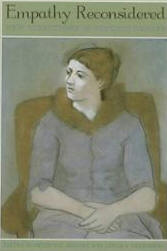 |
Maureen O'Hara is Professor in the Psychology Department at National
University, La Jolla, CA and President Emerita of Saybrook Graduate
School, San Francisco.
Working with American psychologist Carl R. Rogers, she helped develop the
Person-Centered Approach to psychotherapy and large group process.
|
|
More recently her writings have examined the relationship between the "big
picture" changes underway and internal psychological adaptation. Combining
her background as psychotherapist, organizational consultant and futurist,
Maureen is a frequent keynote speaker nationally and internationally on
the evolution of new ways of being in a changing world. She was a
contributor to the book, '
Empathy
Reconsidered: New Directions in Psychotherapy'
.
She writes, "In Rogers' original work a key component of the core
facilitative conditions for individual growth is empathy. Empathy has
since been shown to be the gold standard for effective facilitation in any
growth-focused relationship. Empathy is commonly regarded as an
individual-to-individual phenomenon in which one person senses the
unspoken or inchoate thoughts or feelings of another. Our observations
show that group or relational empathy may be even more important than
individual empathy in the formation of conscious communities."
Sub Conference: Science
|
|
|
|
Dan Zahavi: Dialogs on How to Build a Culture of Empathy
|
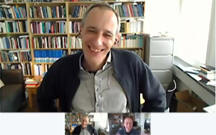 |
|
Dan Zahavi is a Professor in the Department of Media,
Cognition, and Communication at the University of Copenhagen, where he
specializes in the social dimension of self-experience; the nature of empathy
and its relevance for social cognition; the relation between phenomenology and
naturalism; selfhood and unity of consciousness with particular focus on
no-self doctrines. Dan is the director of the
Danish National Research Foundation’s Center for Subjectivity Research.
|
|
The center has a grant for an "Empathy
and Interpersonal Understanding" project that runs from 2011 to 2015.
The aim of the project is to contribute to investigate two
questions:
1) What is empathy and what role does it play in interpersonal
understanding?
2) To what extent does interpersonal understanding presuppose a common
social and cultural background?
Dan
has written numerous articles on the nature of empathy and the center is
hosting workshops and conferences on the topic. One conference being held
in May 2013, is on the "Phenomenology
of Empathy".
Sub Conference:
Science |
|
|
|
Aurangzeb Haneef: How to Build a Culture of Empathy in
Pakistan
|
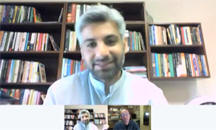 |
|
Aurangzeb Haneef is a religious scholar and teacher in the
Department of Humanities & Social Sciences, Lahore University of
Management Sciences in Pakistan. He completed a Masters of
Theological Studies at Harvard University. Earlier, at two universities in
Austria and Spain he completed an International Master in Peace, Conflict
and Development Studies with a focus on Religion/Islam and Peacebuilding.
|
|
In this dialog and interview, we talked about the role
of empathy as being foundational to peace building. In Pakistan there is
great polarization between the conservative and liberal social factions
and they are not talking to each other with empathy. Aurangzeb sees
empathy as being central to the the peace building process and he works to
create dialog between the different social factions in his classes.
Sub Conference:
Science
|
|
|
|
Ian Reifowitz: Dialogs on How to Build a Culture of Empathy
|
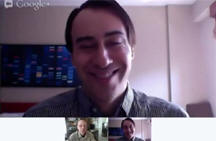 |
 |
Ian Reifowitz teaches history at Empire State College
of the State University of New York. He is the author
of,
Obama's America: A
Transformative Vision of Our National Identity.
In his article,
Obama Calls for Empathy in Israel, Ian writes,
"President Obama gave an
absolutely terrific speech yesterday in Israel. |
The key section of the
speech occurred when the president declared that Israelis need to truly
understand how Palestinians see the conflict differently than they do.
Obama urged them to "put yourself in their shoes. Look at the world
through their eyes... In this piece, I want to point out that this
concept of putting oneself in the shoes of one's opponent or even just
someone different from oneself, i.e., empathy, is at the heart of Obama's
entire worldview...
He has drawn on the idea of empathy repeatedly as part of his push to
encourage and invigorate ties across lines of race, culture, religion,
region, etc. in this country. As I've written in my book Obama's
America: A Transformative Vision of Our National Identity, empathy is
thus central to his call to strengthen our sense of being one American
people. In The Audacity of Hope Obama spoke of empathy
as being "at the heart of my moral code" and defined it as "a call to
stand in somebody else's shoes and see through their eyes."
Sub Conference:
Science |
|
|
|
Sara Konrath: How to Build a Culture of Empathy
|
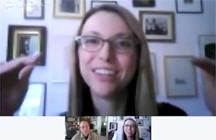 |
|
Sara Konrath is
Assistant Research Professor at the Research Center for
Group Dynamics at the
University of Michigan. Sara
is the Principal Investigator of the Interdisciplinary
Program on Empathy and Altruism Research (iPEAR) which is a research
lab with a primary focus on the costs and benefits of empathy and related
traits (e.g. emotional intelligence, narcissism) and behaviors (e.g.
helping, caregiving). They examine the causes, consequences, and changes
in such topics from a variety of perspectives, including
psychophysiological and neurological. |
She writes; "Imaginatively taking on another person's thoughts and
identifying with their emotions are two habits at the core of empathy.
In fact, empathy is not a fixed trait like having brown eyes or long
fingers. Empathy is instead a delicate cocktail blending assorted
elements of inborn aptitude, social conditioning, personal history, and
practice and motivation.
The ability to empathize is like a muscle capable of
growth, atrophy, disability, and even regeneration (think Scrooge).
People have different innate capacities for building certain muscles,
just as we have different incentives for being empathetic and
experiences in honing our skills to empathize. For some people, empathy
comes easily and naturally; for others, concerted effort is required to
stretch our imaginations beyond ourselves."
We held an engaging two hour discussion about the nature
of empathy and how to foster it.
Sub Conference:
Science
|
|
|
|
Jodi Halpern: Dialogs on How to Build a Culture of Empathy
in Health Care
|
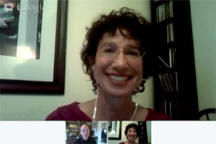 |
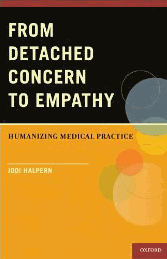 |
Jodi Halpern is Associate Professor of
Bioethics and Medical Humanities at the University of California, Berkeley,
in the Joint Medical Program and the School of Public Health. As a
psychiatrist with a background in philosophy, she investigates how emotions
and the imagination shape healthcare decisions of clinicians and patients.
|
|
Jodi
is author of
From Detached Concern to Empathy: Humanizing Medical Practice
Clinical Empathy: "As a psychiatrist as well as
a faculty member in bioethics at UC Berkeley for almost two decades, I’ve
investigated what happens to patients when their doctors show a lack of
empathy. Doctors were trained to believe that emotional detachment from
patients is personally and professionally necessary, but experience shows
that patients don’t trust doctors who are aloof or superficially friendly.
Yet, only recently have studies proven just how harmful detachment and how
beneficial empathy is for healing...."
Sub Conference: Health Care
and
Science |
| |
|
Panel 21: Philosophy and Empathy |
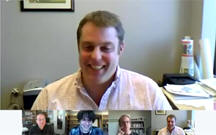 |
|
Anthony I. Jack
Joshua Knobe
Philip Robbins
Edwin Rutsch |
This panel brings together three leading
researchers in the emerging field of experimental philosophy: a
field which uses the experimental methods of the cognitive and
social sciences to shed light on philosophical problems. This is a
free ranging discussion of recent research and work in progress.
|
We discuss
how our conception of the minds of others relates to empathy of
various types, with a particular focus on empathy in the sense of
compassion. The discussion touches on dehumanization,
objectification, and how empathy relates to our tendency to see
minds as embodied, as able to feel different kinds of emotion, and
as possessing autonomy or free will.
Sub Conference:
Science |
|
|
|
Panel 19: The Challenge of
Balancing Analysis and Empathy |
|
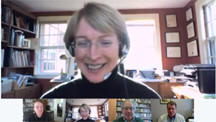 |
|
Anthony Jack
Helen Riess
Richard Boyatzis
Edwin Rutsch |
Recent
evidence shows that adopting an analytic frame of mind suppresses brain
areas involved in empathy, and emotionally engaging with others
suppresses brain areas involved in analytic thought. This presents a
challenge for contexts that require both forms of thought. |
|
Managers, teachers and doctors all have
professional roles in which optimal performance depends both on a
capacity for clear analytic thought, and on their ability to
emotionally resonate with others. This panel brings together three
experts in the neuroscience of empathy and how to train it. They
discuss the challenges involved in fostering a balance between
empathy and analysis in professional life, and suggest solutions.
Sub Conference:
Science |
|
|
|
Louise Grant: Dialogs on How to Build a Culture of Empathy
|
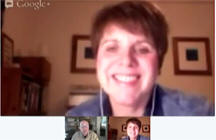 |
|
Louise Grant
is Senior Lecturer in Social Work at the University of Bedfordshire.
Louise has been studying the role of empathy in fostering resilience in
social workers in the UK.
She says, "My teaching interests are in children and families social work
and in particular in developing reflective practice for effective social
work and developing supervision knowledge and skills in social workers. My
research focus is on reflective practice and developing emotional
resilience for social work practice" |
|
Louise is co-author of the
study,
'Exploring Stress Resilience in Trainee Social Workers: The
Role of Emotional and Social Competencies'.
In order to inform the development of interventions to enhance the
work-related well-being of early career social workers, this study
examined several emotional and social competencies (i.e. emotional
intelligence, reflective ability, empathy and social competence) as
predictors of resilience in 240 trainees.
Sub Conferences: Health Care
and
Science |
|
|
|
Issidoros
Sarinopoulos: How to Build a Culture of Empathy Without
Pain
|
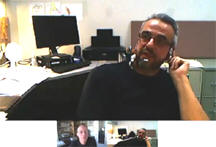 |
|
Issidoros Sarinopoulos (Sid) is Assistant Professor of
Psychology at
Michigan State University where he is director of the Lab for
Social and Affective Neuroscience. Sid's research
interests include the psychological and neural underpinnings of emotion,
judgment, decision making, and social behavior.
His work integrates the theories and methods of
affective and social neuroscience on the one hand, and more traditional
disciplines in the social sciences on the other. |
|
Sid was part of a study looking at how an empathic
doctor-patient relationship reduces patients pain.
Listen up, doc: Empathy raises patients’ pain tolerance.
"A doctor-patient relationship built on trust and empathy
doesn’t just put patients at ease – it actually changes the brain’s
response to stress and increases pain tolerance, according to new findings
from a Michigan State University research team."
Sub Conferences: Health Care
and
Science |
|
|
|
Chad Posick: How to Build a Culture of Empathy
in Criminal Justice
System
|
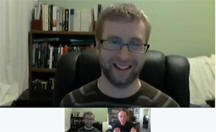 |
|
Chad Posick has a B.S. degree in criminal justice and an
M.S. degree in public policy from the Rochester Institute of Technology.
He just finished his Ph.D in criminal justice from Northeastern University
in Boston, Massachusetts. He has worked with Project Safe Neighborhoods in
the Western District of New York as well as the Department of Criminal
Justice Service’s Project Impact. His research areas include restorative
justice, cognitive behavioral interventions and action research. |
|
We talked about
Chad's research and study:
More Than a Feeling: Integrating Empathy Into the Study of Lawmaking,
Lawbreaking, and Reactions to Lawbreaking. "Empathy
is related, directly or indirectly, to important elements in criminology
such as the enactment of harsh penalties for repeat offenders, antisocial
behavior, feelings of legitimacy toward the law, and attitudes toward the
death penalty. Although empathy is beginning to find its way into
criminological discourse, it is still not well understood nor often
incorporated into quantitative research. "
Sub Conferences:
Science
and
Justice |
|
|
|
Maria Seehausen & Edwin
Rutsch: How to Build a Culture of Empathy with Reflective Listening |
 |
|
Maria Seehausen is a psychologist
and neuroscientist at the Cluster of Excellence: Languages of Emotion of
the Free University Berlin, where she works on her dissertation on the
effects of empathic paraphrasing on emotion in social conflict. She also
works as a freelance
mediator, trainer and coach, and is interested in the scientific
exploration of intervention techniques used in conflict resolution.
Maria is lead on the study, 'Effects of empathic paraphrasing - Extrinsic emotion regulation in
social conflict'. |
"In the present study, we investigated the effects of empathic
paraphrasing as an extrinsic emotion regulation technique in social conflict. We
hypothesized that negative emotions elicited by social conflict can be regulated
extrinsically in a conversation by a listener following the narrator’s
perspective and verbally expressing cognitive empathy.
20 participants were
interviewed on an ongoing or recently self-experienced social conflict... it is possible that empathic paraphrasing not only leads
to a reduction of negative emotion in participants, but even induces
positive emotions, such as happiness and relief about being listened to
and validated.'
Sub Conference:
Science and
Justice
|
|
|
|
Penny
Spikins: How to Build a Culture of Empathy with Archaeology
|
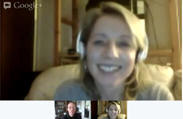 |
|
Penny Spikins
is Senior Lecturer in the Archaeology of Human Origins in the
Department of Archaeology,
University of York. One of her
main areas of research is on the archaeological evidence for the evolution
of empathy and compassion. "My early research centred on Mesolithic northern England where I retain
an interest and enthusiasm, although I'm best known for my later research
into the emergence of autism and the evolution of empathising and
compassion in the Palaeolithic."
Penny is writing a book titled, 'How
Compassion Made Us Human: An archaeology of prehistoric sentiment' |
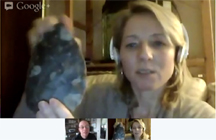 |
|
We discussed;
- why it is important that compassion was key to our
evolutionary history.
- how archaeological evidence can tell us about how compassion evolved.
- how a capacity to put others first in modern hunter-gatherers works to
help them survive, not just as a group but as individual (which helps us
understand the evolutionary pressures in the stone age).
- the building blocks of capacities to put others first in apes, and how
humans take those capacities to another level.
Sub Conference:
Science
|
|
|
|
Anthony
Jack: Dialogs on How to Build a Culture of Empathy
|
|
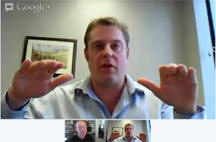 |
|
Anthony Jack, PhD (Tony) is Assistant Professor of Cognitive
Science, Philosophy, and Psychology in the Brain, Mind and Consciousness
laboratory in the Department of Cognitive Science at Case Western Reserve
University, Cleveland, Ohio.
He says, "I have a PhD in Experimental Psychology and extensive training in
Philosophy and Neuroscience. I started out doing largely theoretical work
on consciousness, but then got interested by the emerging field of brain
imaging. I use fMRI to study attention, consciousness and social processing
in the brain." |
Tony has been studying empathy and was involved in a
study that looks at the analytic and empathic neural networks and how
they relate to each other. This article 'Empathy
represses analytic thought, and vice versa' on Science Blog says,
"When the brain fires
up the network of neurons that allows us to empathize, it suppresses the
network used for analysis, a pivotal study led by a Case Western Reserve
University researcher shows... At rest, our brains cycle between the
social and analytical networks. But when presented with a task, healthy
adults engage the appropriate neural pathway, the researchers found.
The study shows for the first time that we have a
built-in neural constraint on our ability to be both empathetic and
analytic at the same time."
Sub Conference:
Science: Neuroscience
|
|
|
|
Mark Rosenblum: Dialogs on How to Build a Culture of Empathy
|
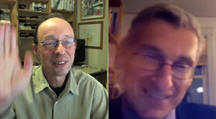 |
|
Mark Rosenblum is Professor of History and Director of
Center for Ethnic, Racial and Religious Understanding
(CERRU)
at
Queens College, New York.
CERRU inspires
a generation of leaders who value cross-cultural engagement, listening, and
empathy to inform positive social change. |
"Building Empathy
-
One of the goals of the program is to increase students’ ability to
understand and empathize with a wide range of experience and opinion.
During the dialogue sessions, our student facilitators lead groups of
students in discussion regarding contentious issues on campus and in the
community. Participants are encouraged to listen actively, and without
judgment, even if they do not agree."
Sub Conference:
Science
|
|
|
|
Paul Gilbert: Dialogs on How to Build a Culture of Empathy
& Compassion
|
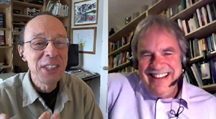 |
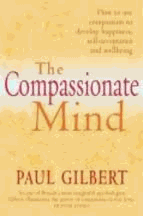 |
Paul Gilbert
is Professor of Clinical Psychology at the University of Derby and
Director of the Mental Health Research Unit, Derbyshire Mental Health
Trust. He has has authored over 20 books, including,
Depression: The Evolution of Powerlessness and the
The Compassionate Mind: A New Approach to Life's Challenges. |
Paul says, "After years of exploring the processes
underpinning shame and its role in a variety of psychopathologies, my
current research is exploring the neurophysiology and therapeutic
effectiveness of compassion focused therapy."
The
publisher describes Compassion-focused therapy (CFT) as "a
form of psychotherapy that emphasizes the development of self-compassion
in people who are prone to feelings of shame and self-criticism. Created
by Paul Gilbert and his colleagues, this therapy is rooted in Mahayana
Buddhist psychology, which considers compassion and mindfulness to be
central to healing the mind. CFT develops four skills: compassionate
attention, compassionate thinking, compassionate behavior, and
compassionate feeling.
This therapy has been proven effective for the treatment of eating
disorders, depression, anxiety, and other mental health conditions, and
can even benefit those who do not suffer from these disorders as it
improves emotional regulation, distress tolerance, and nonjudgment."
In this interview, Paul and Edwin have a wide ranging
discussion about shame, depression, empathy and compassion, as well as,
how to foster compassion in society.
Sub Conference:
Science
|
|
|
|
Daniel Siegel
M.D.:
Dialogs on How to Build a Culture of Empathy
|
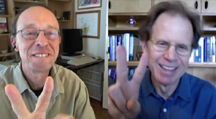 |
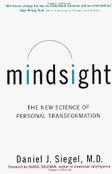 |
Daniel Siegel
M.D.
is a clinical professor of psychiatry at the UCLA School
of Medicine and Executive Director of the Mindsight Institute. His
training is in pediatrics and child, adolescent and adult psychiatry.
Dan
is the author of many books on parenting, child development,
Mindsight, etc. |
including
The Developing Mind, Second
Edition: How Relationships and the Brain Interact to Shape Who We
Are
and
The Mindful Brain: Reflection and Attunement in the Cultivation of
Well-Being.
Dan shared his understanding about the importance of empathy and how it
works in the brain thought mirror neurons. "When kids are able to watch
an interaction that's empathic, empathy isn't just being taught; it's
being demonstrated," Talking about the importance of empathic
attunement, Dan says, "When we attune with others we allow our own
internal state to shift, to come to resonate with the inner world of
another. This resonance is at the heart of the important sense of
“feeling felt” that emerges in close relationships. Children need
attunement to feel secure and to develop well, and throughout our lives
we need attunement to feel close and connected."
Sub Conference:
Science
|
|
|
|
Geshe Lobsang Negi: Dialogs on How to Build a Culture of Empathy
and Compassion
|
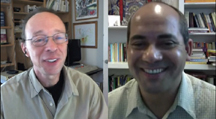 |
|
Geshe Lobsang Negi serves as Co-Director of the Emory-Tibet
Science Initiative and Co-Director of the Emory Collaborative of
Contemplative Studies. " In addition, he has contributed to the development
of a number of programs linking Emory University with Tibetan institutions
of higher learning in India.
|
His career has focused on the potential of mind to affect
well-being on physical, emotional an mental levels and is now centered in
three areas: Clinical research on the behavioral, immune and stress impacts
of contemplative practices; Developing and implementing a science
curriculum for Tibetan monastics; and Teaching Tibetan Buddhism both at
Emory University and Atlanta's Drepung Loseling." He is also the developer
of the
Cognitive-Based
Compassion Training (CBCT) which
draws on the the lojong tradition of Tibetan Buddhism to foster
compassion. This
training was studied to determine it's effectiveness in fostering
empathy by
Jennifer Mascaro
at Emory University.
Sub Conference:
Science
|
|
|
|
Joshua Aaron Ginzler: How
to Build a Culture of Empathy-Compassion with Education |
|
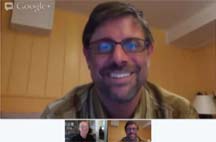 |
|
Joshua Aaron Ginzler is a
Psychologist with a focus on Mindfulness-Based Psychology which teaches
that thoughts simply exist & are your brain's attempt to make sense of your
emotional state & the external world. He says, "I am establishing the only private center to bring a cadre of
evidence-based Mindfulness Psychology programs to the community in order to
better prepare the community to support the individuals and families that
they contain. "
Sub Conference:
Science |
|
Christian Keysers: The
Empathic Brain - Chapter by Chapter Book Review |
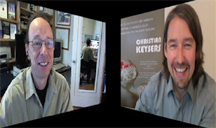 |
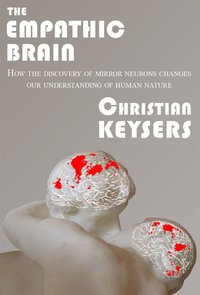 |
Christian Keysers is professor and group leader of the Social Brain Lab at
the University Medical Center Groningen in the Netherlands. The lab
explores the biological nature and neuroscience of empathy.
Christian is author of 'The Empathic Brain: How the Discovery of Mirror
Neurons Changes our Understanding of Human Nature'. |
In this interview, Christian gives a chapter
by chapter narration of the book, which explores the nut's and bolts
neuroscience of empathy. In the book, he illustrates the science with
his own experiences and with stories. The journey starts at the lab in
Parma, Italy where mirror neurons were first discovered and where he
also worked.
Sub Conference:
Science: Neuroscience
|
|
|
|
Bhismadev Chakrabarti: How to Build a Culture of Empathy with Science
|
 |
|
Bhismadev Chakrabarti
heads
a research group at the Centre for Integrative Neuroscience and
Neurodynamics at the University of Reading, UK. The group studies emotion
perception, empathy, and autism using functional MRI, eye gaze tracking,
and psychophysiology. He works in collaboration with the Autism
Research Centre at the University of Cambridge. Bhisma
shared his insights into the physical nature of empathy and how we can
build a culture of empathy.
|
"Empathy is the lens through which we view emotions in others. The highly
empathic can sense others' emotions automatically, while those with
lower empathy are
often marked by a deficit in picking up socio-emotional cues from other
people. Empathy exists in a continuum across the population, and our
research here targets the following questions:
a) how does empathy influence the perception of emotions in others and
in ourselves?
b) what are the neural and behavioral processes underlying empathy?"
Sub Conference:
Science: Neuroscience
|
|
|
|
George Lakoff: Dialogs on How to Build a Culture of Empathy
|
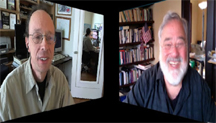 |
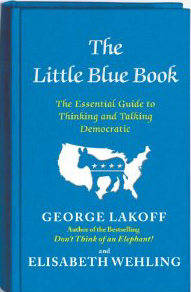 |
George Lakoff is a cognitive linguist and professor of
linguistics at the University of California, Berkeley. He is academically
most famous for his 'ideas about the centrality of metaphor to human
thinking, political behavior and society.' He says empathy is a
foundation of morality and of progressive values. |
George is the author of many academic and politically
related books.
His latest book is The Little Blue Book: The Essential Guide to Thinking
and Talking Democratic. 'A compact handbook on partisan political
discourse, with a blueprint for how liberals can switch from playing
defense against conservatives to launching a stronger offense.' Basing
the discourse on the foundational value of empathy.
"America was founded on a moral system and that system starts with
empathy."
Sub Conference:
Science: Neuroscience
|
|
|
|
Paul Zak: Dialogs on How to Build a Culture
of Empathy with Oxytocin |
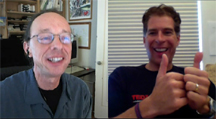 |
 |
Paul J. Zak is Professor of Economics
and Department Chair, as well as the founding Director of the Center for
Neuroeconomics Studies at Claremont Graduate University.
He is author of: The Moral Molecule: The
source of love and prosperity,
which explores the relationship
between Oxytocin, empathy, compassion, trust, etc.
|
"The Moral Molecule is a first-hand account of the discovery of a molecule that makes us moral. It reveals that compassion
[and empathy] is part of our
human nature, why loneliness can kill you, and why your neighbor may be
a psychopath."
Sub
Conference: Science
|
|
|
|
Emma Seppala:
Dialogs on How to Build a Culture of Empathy & Compassion
|
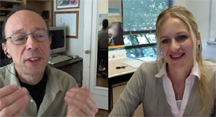 |
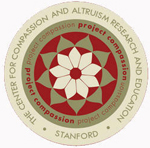 |
Emma Seppala originates from Paris, France and is Associate
Director at the Center for Compassion and Altruism Research and Education
(CCARE) at Stanford University. She is an Honorary Fellow at the Center
for Investigating Healthy Minds in Madison, Wisconsin.
|
Her research areas include:
Complementary & Alternative Interventions (yoga, meditation);
The Science of Happiness,
Health, Well-Being; Stress; Trauma;
Emotion and Emotion Regulation; Compassion,
Social Connectedness; Cross-Cultural Psychology.
Sub
Conference: Science
|
|
|
|
Erika Rosenberg:
Dialogs on How to Build a Culture of Empathy with Education |
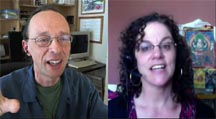 |
 |
Erika Rosenberg offers scientifically-
and practically-based training and consultation in a wide range of
areas associated with the study and/or understanding of human
emotion, facial expressions of emotion, and the improvement of
emotional functioning through meditation.
|
Erika has been practicing meditation for
over 20 years. She is a senior teacher for Project Compassion at
the Center for Compassion and Altruism Research and Education
(CCARE) at Stanford University where she teaches the 9-week
Compassion Cultivation Training (CCT). The training combines
science, mindfulness and Compassionate Communications traditions.
Sub
Conference: Science and
Education
|
|
|
|
Frans de Waal talks with Edwin about
the Nature of Empathy |
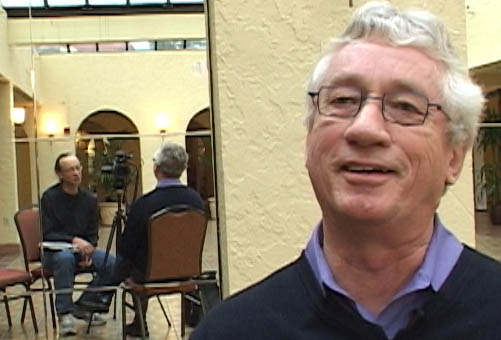 |
 |
How can we build a culture of
empathy?
I think it is important in society, especially at the moment.
Now that we have come out of this period where greed was so good. I
think it is important to emphasize that there are alternative ways
of looking at society. A society where solidarity is important and
caring about others is important.
The other things, that I'm not an
expert on, is education and culture of course. A cultural and
educational change that emphasizes empathy more. I would also warn
that empathy is not invariably positive. People think that empathy
is automatically a positive characteristic. Empathy can be used for
bad purposes also.
Sub Conference: Science |
|
|
|
Paul Ekman talks about the
Nature of Empathy and Compassion with Edwin Rutsch
|
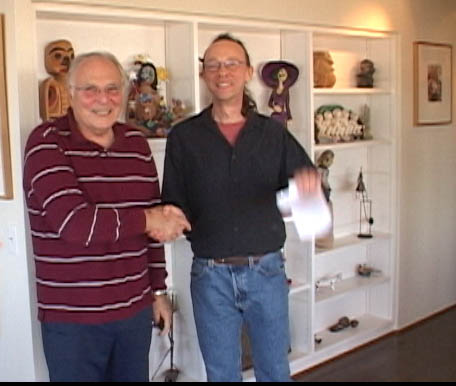 |
 |
How can we build a culture of
empathy?
'The survival of the planet as we know it depends on global
compassion...
If I was president, thank god I'm
not, I would start a Manhattan Project on global empathy. It has the
urgency of the Manhattan Project. It needs the bringing together of
the best minds in the world to focus on this issue, because there is
an urgency too it. I think Al Gore was right, that time is running
out. We can't wait 20 or 40 years to figure out what to do with this
problem."
Sub Conference: Science |
|
|
|
Maia Szalavitz: Dialogs on How to Build a Culture of Empathy |
|
 |
 |
Coauthor: Born for Love: Why Empathy Is
Essential and Endangered
Empathy - fully expressed in a community of
nurturing interdependent people - promotes health, creativity,
intelligence, and productivity. In contrast, apathy and lack of
empathy contribute to individual and societal dysfunction,
inhumane ideologies, and often brutal actions.
Sub Conference: Science |
|
|
|
Kristin Neff Talks with Edwin about Empathy and Self-Compassion |
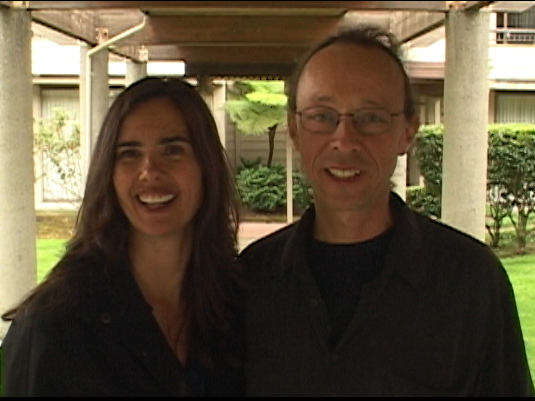 |
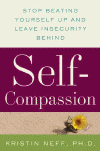 |
Kristin Neff, author of
Self-Compassion: Stop Beating Yourself Up and Leave Insecurity
Behind, talks with Edwin about the nature of empathy,
self-empathy self-compassion and compassion.
"Compassion is a huge value of
mine. Now I like to use the term open-heartedness, because
compassion tends to be specific to the context of suffering. Of
course we want to have open hearts in the face of suffering, but
also want to have open hearts in the face of joy and when we are at
our bests and have great successes and achievements. Just keep our
hearts open no matter what happens, positive, negative or even
neutral. Open mind and open heart, just trying to stay open."
Sub Conference: Science |
|
|
|
Patricia
Jennings: How to Build a Culture of Empathy in Education
|
 |
|
Patricia (Tish) Jennings is Co-Leader of the "Program on Empathy Awareness and
Compassion in Education (PEACE)" at Penn State University.
"The PEACE area seeks
to promote health and wellbeing in children, youth and families through the
scientific understanding and promotion of awareness, compassion and
empathy. The program includes faculty, research associates and students
whose work focuses on developing a strong multidisciplinary science in this
emerging area. |
PEACE supports
interdisciplinary scholarly activities ranging from theoretical essays
to basic research on the development of awareness, compassion and
empathy, to the design and evaluation of interventions intended to
foster these attributes in individuals and relationships."
Sub
Conferences: Science
and
Education
|
|
|
|
Joshua Davis: Empathy Report:
5th Annual Meeting - Social & Affective Neuroscience Society
|
|
 |
|
Josh Davis
is Term Assistant Professor at Barnard College, NY.
His research deals with adaptive emotional state control and mind-body
connections. While not an expert in empathy, in this
interview, Josh gives us a report on some of the latest
findings about the nature of empathy from the 5th Annual Meeting of the
Social & Affective Neuroscience Society.
- Symposium Session A: Empathy
- Empathy
for Positive and Negative Emotions:
- Poster Session D (Empathy, Culture, Social Interaction...)
- Session I Empathy & Choice
Sub Conference:
Science: Neuroscience |
|
|
Art Markman: How to Build a Culture of
Empathy with Science
|
 |
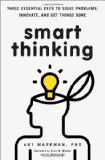 |
Art Markman, PhD is a cognitive scientist at the University
of Texas. He writes blog entries for Psychology Today, Huffington Post,
Harvard Business Review, and YouBeauty.com.
Author. Smart Thinking: Three Essential Keys to Solve Problems, Innovate,
and Get Things Done |
"Why Empathy
Makes You More Helpful. There is a lot of research suggesting
that empathy increases people’s desire to help others. Empathy is the
ability to share other people’s emotion. The better able you are to feel
what someone else is feeling, the more likely you are to want to help
them when they are in a difficult situation. This ability also extends
to animals. We are able to project feelings onto animals like dogs, and
that increases our need to help them. But, what is it about empathy
that promotes the need to help?"
Sub
Conference: Science
|
|
|
Lidewij Niezink: Dialogs on How to Build a
Culture of Empathy
|
|
 |
|
Lidewij hosts the Empathy and Charter for
Compassion groups on Linkedin. Her Ph.D was in empathy and altruism. She
is a strategic advisor, trainer and innovator, and helps organizations,
groups and individuals to implement different aspects of empathic concern
into their professional as well as private lives.
How to build a culture of empathy? Stop looking for the
qualities of empathy and compassion outside of ourselves. We ALL possess
these qualities already (as research is showing us). Develop and make use
of the methods offered to cultivate empathy and compassion within
ourselves according to what speaks to our individual minds and hearts...
Sub
Conference: Science |
|
|
|
Luisa
Semedo: How to Build a Culture Based on a Morality & Ethics of Empathy
|
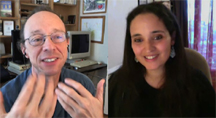 |
|
Luísa
Semedo is a PhD Philosophy student at the University of Paris-Sorbonne,
France. Her
PhD dissertation is about Ethics of Empathy. The aim of her
interdisciplinary work is to frame a new ethics in which empathy is its
foundation (contagion, empathic distress and imitation), its instrument
(simulation, imagination and empathic concern) and its purpose (trust,
altruism, cooperation and respect). |
She says that empathy is
like dreams, because in dreams we can be a different version of ourselves.
In real life, empathy allows us to put ourselves in the place of others,
and experienced others lives. Because of our common humanity others are a
possibility of us. The opposite of empathy is a desert island.
Sub Conference:
Science
|
|
|
Matthew Winslow: Dialogs on How to Build a Culture of Empathy
|
|
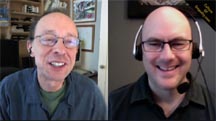 |
|
Matthew Winslow is
Associate Professor in the
Psychology Department at
Eastern Kentucky University.
He teaches a class on empathy in
the filed of
psychology.
Matthew says empathy is like being an actor and the
best Halloween costume ever. He
sees empathy as a skill that can be developed with
practice. People need both the motivation to empathize and the ability to
do so. Narcissism is the opposite of empathy because it’s
the narrow focus on the self. The opposite of empathy is wearing mirrored
sunglasses on backwards so you only see yourself.
Sub
Conference: Science |
|
|
|
Tal-Chen Rabinowitch: How to Build a Culture
of Empathy with Music Arts
|
|
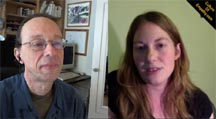 |
|
Tal-Chen is working in Cambridge towards a PhD. Her
research explores the social nature of musical group interaction in
children and the ways in which it can be directed towards the long-term
enhancement of emotional empathy. This work explores experimentally the
effects of musical group interaction on children’s every day capacity for
empathy, and in particular, the emotional impact of synchronization during
musical interaction. Her research suggests that music promotes empathy.
She
says her metaphor for empathy is like closing the distance between people
and merging while the opposite is distance and a wall.
Sub Conferences:
Science and
Arts |
| |
|
Interview with Rick
Hanson on Empathy |
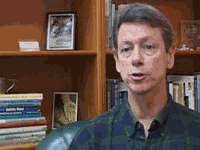 |
 |
I have a special interest, a particular
interest in practical methods,
useful things, found at the intersection of psychology, brain science
and contemplative practice... I think looking out at the world today, we have
a crises of empathy in a way.
Sub Conference: Science |
|
|
|
Carolyn Pedwell:
Dialogs on How to Build a Culture of Empathy
|
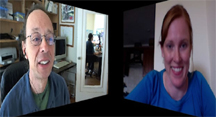 |
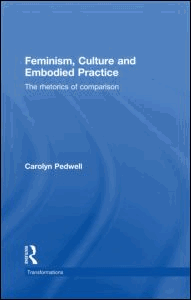 |
Carolyn Pedwell is a
Lecturer in Media and Cultural Studies,
School of Arts and Cultures,
Newcastle University
in the UK. Author
Feminism,
Culture and Embodied Practice: The Rhetorics of Comparison.
Forthcoming Book: Affective Relations: The Transnational Politics of
Empathy. |
How to build a culture of empathy? .Realizing that 'empathy' is not one thing and that it may not always
be positive. A critical approach to thinking through the politics of
empathy needs to consider the ways in which empathy may produced,
mobilized and be felt differently across different times, spaces and
contexts. It also needs to take into account the risks and
contradictions of practices of empathetic engagement, as well as their
more productive possibilities. Rather than thinking about
empathy as a discrete or singular emotion, I'd recommend that we think
more critically about the ways in which it is linked with other
emotions, such as power, shame, etc.
Sub
Conference: Science
|
|
|
|
Keiko
Krahnke: How to Build a Culture of Empathy in Business
|
 |
|
Keiko Krahnke is
Associate Professor of Management; Business Communications at
University of Northern Colorado in the Montfort College of Business.
Areas of research interests include spirituality and business, systems
thinking, Appreciative Inquiry, and corporate citizenship. Currently
interested in learning about human consciousness and teaching empathy and
compassion. |
She says, Empathy is wholeness and knowing that we are all part of one
field and are interconnected. The opposite of Empathy is being trapped in narcissism.
Coauthor: Empathy, Connectedness and Organisation. 'In
this paper, we conceptually explore the role of empathy as a
connectedness organising mechanism. We expand ideas underlying positive
organisational scholarship and examine leading-edge studies from
neuroscience and quantum physics that give support to our claims. The
perspective we propose has profound implications regarding how we
organise and how we manage. First, we argue that empathy enhances
connectedness through the unconscious sharing of neuro-pathways that
dissolves the barriers between self and other.'
Sub Conferences:
Education and
Workplace
|
|
|
|
Debbie Custance:
Study on Dogs having Empathy for People in Distress
|
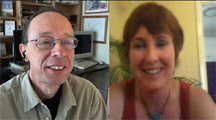 |
 |
Debbie Custance is a lecturer at Goldsmiths College,
Department of Psychology, London. She coauthored a study titled,
'Empathic-like responding by domestic dogs to distress in
humans: An exploratory study'. |
The study tested how dogs respond to someone pretending
to cry and be in distress. The majority of dogs came over to the
person crying in a way that seemed to express empathic
concern. "When the stranger pretended to cry,
rather than approaching their usual source of comfort, their owner, dogs
sniffed, nuzzled and licked the stranger instead. The
dogs’ pattern of response was behaviorally consistent with an expression
of empathic concern..."
Sub Conference:
Science
and
Animals & Nature
|
|
|
|
Piercarlo Valdesolo:
How to Build a Culture of Empathy with Science
|
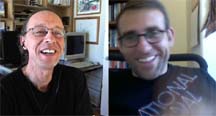 |
|
Piercarlo Valdesolo is
an Assistant Professor of
Psychology and head of the Moral Emotions and Trust Lab at
Claremont McKenna College. "I study the role of emotions in social and moral decision making. My
research program investigates the role of emotion in social judgment, with
a specific focus on how affective processes shape moral decisions and
prosocial/antisocial behavior at both the individual and intergroup levels." |
Piercarlo has two
main lines of research. One focuses on the role of synchronous movement
in arousing prosocial emotional responses. Two is on the psychological biases that contribute to unethical decision making and corruption within institutions and organizations.
One way Piercarlo says we can build empathy is by being more open and revealing more of
ourselves.
Sub Conference:
Science
|
|
|
|
Marc Brackett: How to Build a Culture of Empathy & Compassion
|
|
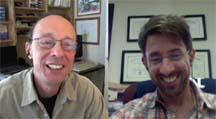 |
|
Marc Brackett is a Research Scientist in the Department of
Psychology at Yale University. He also is Deputy Director of Yale's Health,
Emotion and Behavior Laboratory and Head of the Emotional Intelligence Unit
in the Edward Zigler Center in Child Development and Social Policy.
He is the lead developer of The RULER Approach to Social and Emotional
Learning, an evidence-based social and emotional learning (SEL) program
that currently is implemented in hundreds of schools throughout the United
States and abroad. The acronym RULER refers to the five key emotion skills
of Recognizing, Understanding, Labeling, Expressing, and Regulating
emotions. Marc says authenticity is his most important value.
Sub Conference:
Science |
|
|
|
Russell Kolts: How to Build a Culture of
Empathy and Compassion
|
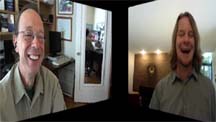 |
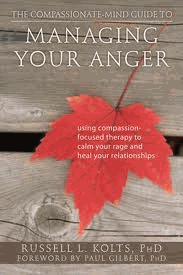 |
Russell Kolts is a professor in psychology at Eastern
Washington University. His current research and professional work is
focused upon Compassion Focused Therapy (CFT) and the application of CFT
in working with emotional difficulties, particularly anger and attachment
disturbances. |
Russell is author of 'The
Compassionate Mind Approach to Managing Your Anger.' The
Compassionate-Mind Guide to Managing Your Anger will show you how to
take responsibility for your anger and your life by cultivating a new
strength: the power of compassion.
Russell hosts the
CompassionateMind.net
website, which is the online hub of the Inland Northwest Compassionate Mind Center.
The center is committed to the development and application of
evidence-based practices utilizing the purposeful cultivation of
compassion and mindfulness to promote wellbeing.
Sub Conference:
Science
|
|
|
|
Lynne Henderson: Shyness, Anxiety & How to
Build a Culture of Empathy
|
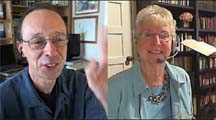 |
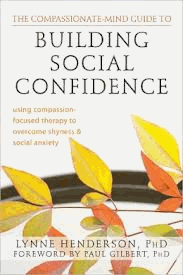 |
Lynne Henderson is director of the
Shyness Institute
and Director of the Stanford Shyness Clinic for over 25 yrs.
Lynne is author of
Building Social Confidence: Using Compassion-Focused Therapy to Overcome
Shyness and Social Anxiety.
The
book offers
a supportive program based in compassion-focused therapy for moving past
social anxiety and the self-critical thoughts that propel it.
|
How to build a culture of empathy?
1. Each of us practicing mindfulness and empathy ourselves consistently.
Making mindfulness part of daily life, continuing to increase the number
of classes/groups that have formed around mindfulness, disseminating
these from elementary school on.
2. Increasing funding for research related to mindfulness and empathy,
focusing on the beneficial results of empathy on the well being of self
and others.
3. Increasing the focus on and conducting more research on compassion
based psychotherapies such as my Social Fitness Training for shyness,
Gilbert’s Compassion Focused Therapy, and Acceptance and Commitment
Therapy. My book,
4. Increasing the understanding and practice
of compassion throughout the world through internet information
dissemination and putting psychological interventions online.
Sub Conference:
Science
|
|
|




















